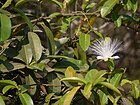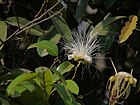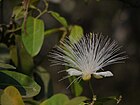Note: This is a project under development. The articles on this wiki are just being initiated and broadly incomplete. You can Help creating new pages.
Difference between revisions of "Capparis mooni"
| Line 1: | Line 1: | ||
[[File:Capparis moonii - flower.JPG|thumb|right]] | [[File:Capparis moonii - flower.JPG|thumb|right]] | ||
| + | '''Capparis moonii''' is a thorny, evergreen, climbing shrub. It grows into the surrounding vegetation up to a height of 10 metres or more. When growing in open areas the plant normally adopts a lower, more bushy habit. The plant is harvested from the wild for local use as a food and medicine. Extracts of the plant are used in commercial cosmetic preparations. | ||
==Uses== | ==Uses== | ||
{{Uses|}}, {{Uses|}}, {{Uses|}}, {{Uses|}}, {{Uses|}}, {{Uses|}}, {{Uses|}}, {{Uses|}}, {{Uses|}}, {{Uses|}}, {{Uses|}}. | {{Uses|}}, {{Uses|}}, {{Uses|}}, {{Uses|}}, {{Uses|}}, {{Uses|}}, {{Uses|}}, {{Uses|}}, {{Uses|}}, {{Uses|}}, {{Uses|}}. | ||
| Line 28: | Line 29: | ||
==Habit== | ==Habit== | ||
| − | {{Habit|}} | + | {{Habit|Evergreen climber}} |
==Identification== | ==Identification== | ||
| Line 53: | Line 54: | ||
==Commonly seen growing in areas== | ==Commonly seen growing in areas== | ||
| − | {{Commonly seen|}}, {{Commonly seen|}}, {{Commonly seen|}}, {{Commonly seen| | + | {{Commonly seen|Moist deciduous forests}}, {{Commonly seen|Semi-evergreen forests}}, {{Commonly seen|Rocky coastal areas}}, {{Commonly seen|Laterite soils along rocky slopes}}. |
==Photo Gallery== | ==Photo Gallery== | ||
Revision as of 17:40, 8 April 2020
Capparis moonii is a thorny, evergreen, climbing shrub. It grows into the surrounding vegetation up to a height of 10 metres or more. When growing in open areas the plant normally adopts a lower, more bushy habit. The plant is harvested from the wild for local use as a food and medicine. Extracts of the plant are used in commercial cosmetic preparations.
Contents
- 1 Uses
- 2 Parts Used
- 3 Chemical Composition
- 4 Common names
- 5 Properties
- 6 Habit
- 7 Identification
- 8 List of Ayurvedic medicine in which the herb is used
- 9 Where to get the saplings
- 10 Mode of Propagation
- 11 How to plant/cultivate
- 12 Commonly seen growing in areas
- 13 Photo Gallery
- 14 References
- 15 External Links
Uses
[[:Category:Ayurvedic Herbs known to be helpful to treat |]], [[:Category:Ayurvedic Herbs known to be helpful to treat |]], [[:Category:Ayurvedic Herbs known to be helpful to treat |]], [[:Category:Ayurvedic Herbs known to be helpful to treat |]], [[:Category:Ayurvedic Herbs known to be helpful to treat |]], [[:Category:Ayurvedic Herbs known to be helpful to treat |]], [[:Category:Ayurvedic Herbs known to be helpful to treat |]], [[:Category:Ayurvedic Herbs known to be helpful to treat |]], [[:Category:Ayurvedic Herbs known to be helpful to treat |]], [[:Category:Ayurvedic Herbs known to be helpful to treat |]], [[:Category:Ayurvedic Herbs known to be helpful to treat |]].
Parts Used
[[:Category:Herbs with used in medicine|]], stem, leaves, Root.
Chemical Composition
Common names
| Language | Common name |
|---|---|
| Kannada | |
| Hindi | |
| Malayalam | |
| Tamil | |
| Telugu | |
| Marathi | |
| Gujarathi | |
| Punjabi | |
| Kashmiri | |
| Sanskrit | |
| English |
Properties
Reference: Dravya - Substance, Rasa - Taste, Guna - Qualities, Veerya - Potency, Vipaka - Post-digesion effect, Karma - Pharmacological activity, Prabhava - Therepeutics.
Dravya
Rasa
Guna
Veerya
Vipaka
Karma
Prabhava
Habit
Identification
Leaf
| Kind | Shape | Feature |
|---|---|---|
Flower
| Type | Size | Color and composition | Stamen | More information |
|---|---|---|---|---|
| {{{5}}} |
Fruit
| Type | Size | Mass | Appearance | Seeds | More information |
|---|---|---|---|---|---|
Other features
List of Ayurvedic medicine in which the herb is used
Where to get the saplings
Mode of Propagation
[[:Category:Index of Plants which can be propagated by |]]
How to plant/cultivate
Commonly seen growing in areas
Moist deciduous forests, Semi-evergreen forests, Rocky coastal areas, Laterite soils along rocky slopes.
Photo Gallery
References
External Links
- [ ]
- [ ]
- [ ]
- Ayurvedic Herbs known to be helpful to treat
- Herbs with used in medicine
- Herbs with stem used in medicine
- Herbs with leaves used in medicine
- Herbs with Root used in medicine
- Habit - Evergreen climber
- Index of Plants which can be propagated by
- Herbs that are commonly seen in the region of Moist deciduous forests
- Herbs that are commonly seen in the region of Semi-evergreen forests
- Herbs that are commonly seen in the region of Rocky coastal areas
- Herbs that are commonly seen in the region of Laterite soils along rocky slopes
- Herbs




